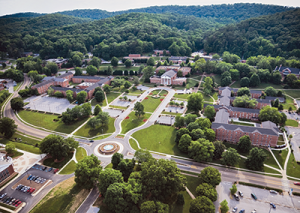
By Natalia Perez
Living in Tennessee for five years and attending Southern Adventist University for 4.5 of them, I’ve watched my university ebb and flow into different versions of itself, as did the students before me.
In 2017, U.S News & World Report ranked Southern as the most diverse university in the South, tied with Keiser University and the University of North Carolina. This year, Southern is ranked third in the region, with Keiser University in first-place and Marymount University and the University of North Carolina tied for second. Southern trails very close behind with a diversity index of .68, only .1 point lower than its second place counterparts.
I believe, along with many students who attend Southern, that we find ourselves with a very unique opportunity: We are the only institution in the state with as much cultural representation as we have. Therefore, successfully integrating could serve as an example here in the South, showing that different cultures and ethnicities can truly come together as one single tribe.
By successfully integrating, I don’t just mean that we all manage to share the same campus and tolerate each other. But do we celebrate each other? Do we understand, or try to understand, each others’ backgrounds, history, culture, and struggles?
While diversity has been widely discussed in higher-education, are diverse colleges and universities truly proud of that status? Or is it all about the numbers?
In the fall semester of 2018, the ethnic breakdown of Southern students showed that Whites constituted 46 percent of the university’s population, Hispanics constituted 24 percent, Asians constituted 12 percent, African-Americans constituted 11 percent, Hawaiians and Pacific Islanders each constituted less than one percent of students identified with two or more races.
Compared to previous years, there is no longer a dominant ethnic majority, as all ethnicities make up nearly half of the population. While some of us may flaunt this fact, are we as well integrated as we are diverse? The timeline below shows some brief highlights of Southern’s race relations history, and our efforts to culturally integrate over the years.
Celebrating individual cultures: A threat to unity?
Throughout Southern’s race relations progress, many questions have been raised and many still remain. Although our student-body now represents several cultural identities, some may ask if all are being taken into consideration by the ones who create the structure for us to thrive and learn in. Recognizing that there are several ethnicities present is one thing, but searching for ways to provide an environment where people from all backgrounds feel deeply seen and understood is important.
An argument that’s often brought up, especially in our current political climate, is that celebrating our individual cultures is detrimental to our university’s unity. Celebrating cultural differences, by some, is seen as a way to isolate certain people groups from others. Validating one culture while invalidating the rest.
Brandon Beneche, recent Southern alum, thinks that cultural celebrations should be a welcome practice on any campus as long as they are inclusive, educational, and fair.
“If a celebration excludes other peoples, promotes an inaccurate and damaging depiction of an ethnic group, or fails to represent its culture ethically, then I think cultural celebrations can be harmful,” Beneche shared.
“I believe one of the most effective ways our university can have better cultural integration is by developing a more understanding and accepting student body. It’s easy to say that one race needs to be more understanding of another, but that’s a bit shortsighted in my opinion. I’d argue that a student body that can demonstrate Christ’s love and patience while having informative and, occasionally, difficult conversations about race and culture with each other can make real strides towards a healthier level of integration.”
Rhidge Garcia, student association president, believes that celebrating individual cultures allows him to better appreciate the unique narratives they tell. He believes other entities and organizations on campus, other than student association and our cultural clubs, should get involved in the celebration of different cultures.
“I think it would be powerful for a student to be celebrated not only for one night a year, but also in the classroom, dormitory, professor’s office, and greater campus property,” Garcia shared. “The only reason why people might think that the celebration of cultures is divisive is because they are not willing to listen to those who haven’t been listened to. It sounds harsh, but it is imperative for us to listen to each other. And if people don’t want to listen, they will not see the importance of celebrating other individual cultures.”
Tierra Hayes, editor-in-chief of Southern’s university paper, the Southern Accent, says that celebrating individual cultures is something that should unite us, but it depends on our personal perspectives.
“By highlighting our differences, we can celebrate what makes each of us unique, but that doesn’t discount other cultures,” Hayes shared.
“I think people might see individual cultural celebrations as divisive because they fail to see how they play into the equation. They may also feel as if the highlighting of other cultures is meant to suppress their personal culture, while it is usually just a tool to enlighten and uplift the marginalized. We need to be able to understand and embrace others, without having to make minorities assimilate to ensure the continuance of the dominant culture. Cultural clubs shouldn’t be sequestered off to one month or even one night. It would make more sense to have such cultures reflected in different worship styles on a rotation, instead of having one culture as the default and the minority cultures solely as special features.”
I believe that true unity is able to celebrate our cultural identity as a whole while also being strong enough to not be threatened by acknowledging and celebrating our individual cultural uniqueness. However, I want to hear your thoughts. How do you think we can integrate better? What are your thoughts on cultural celebrations? Join the discussion below!